
The Nasdaq Stock Market is an American stock exchange based in New York City. It is the most active stock trading venue in the U.S. by volume, and ranked second on the list of stock exchanges by market capitalization of shares traded, behind the New York Stock Exchange. The exchange platform is owned by Nasdaq, Inc., which also owns the Nasdaq Nordic stock market network and several U.S.-based stock and options exchanges. Although it trades stock of healthcare, financial, media, entertainment, retail, hospitality, and food businesses, it focuses more on technology stocks. The exchange is made up of both American and foreign firms, with China and Israel being the largest foreign sources.

The New York Stock Exchange is an American stock exchange in the Financial District of Lower Manhattan in New York City. It is the largest stock exchange in the world by market capitalization.
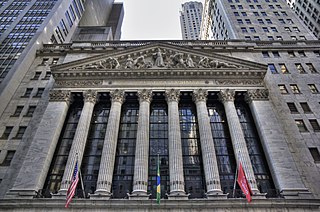
A stock exchange, securities exchange, or bourse is an exchange where stockbrokers and traders can buy and sell securities, such as shares of stock, bonds and other financial instruments. Stock exchanges may also provide facilities for the issue and redemption of such securities and instruments and capital events including the payment of income and dividends. Securities traded on a stock exchange include stock issued by listed companies, unit trusts, derivatives, pooled investment products and bonds. Stock exchanges often function as "continuous auction" markets with buyers and sellers consummating transactions via open outcry at a central location such as the floor of the exchange or by using an electronic system to process financial transactions.

Stock car racing is a form of automobile racing run on oval tracks and road courses. It originally used production-model cars, hence the name "stock car", but is now run using cars specifically built for racing. It originated in the southern United States; its largest governing body is NASCAR. Its NASCAR Cup Series is the premier top-level series of professional stock car racing. Australia, Canada, New Zealand, Mexico, Brazil, Argentina, and the United Kingdom also have forms of stock car racing. Top-level races typically range between 200 and 600 miles in length.

The Dow Jones Industrial Average (DJIA), Dow Jones, or simply the Dow, is a stock market index of 30 prominent companies listed on stock exchanges in the United States.

A stock market, equity market, or share market is the aggregation of buyers and sellers of stocks, which represent ownership claims on businesses; these may include securities listed on a public stock exchange as well as stock that is only traded privately, such as shares of private companies that are sold to investors through equity crowdfunding platforms. Investments are usually made with an investment strategy in mind.
Investment is traditionally defined as the "commitment of resources to achieve later benefits". If an investment involves money, then it can be defined as a "commitment of money to receive more money later". From a broader viewpoint, an investment can be defined as "to tailor the pattern of expenditure and receipt of resources to optimise the desirable patterns of these flows". When expenditures and receipts are defined in terms of money, then the net monetary receipt in a time period is termed cash flow, while money received in a series of several time periods is termed cash flow stream.
In finance, equity is an ownership interest in property that may be offset by debts or other liabilities. Equity is measured for accounting purposes by subtracting liabilities from the value of the assets owned. For example, if someone owns a car worth $24,000 and owes $10,000 on the loan used to buy the car, the difference of $14,000 is equity. Equity can apply to a single asset, such as a car or house, or to an entire business. A business that needs to start up or expand its operations can sell its equity in order to raise cash that does not have to be repaid on a set schedule.

A stock character, also known as a character archetype, is a type of character in a narrative whom audiences recognize across many narratives or as part of a storytelling tradition or convention. There is a wide range of stock characters, covering people of various ages, social classes and demeanors. They are archetypal characters distinguished by their simplification and flatness. As a result, they tend to be easy targets for parody and to be criticized as clichés. The presence of a particular array of stock characters is a key component of many genres, and they often help to identify a genre or subgenre. For example, a story with the stock characters of a knight-errant and a witch is probably a fairy tale or fantasy.

A ticker symbol or stock symbol is an abbreviation used to uniquely identify publicly traded shares of a particular stock or security on a particular stock exchange. Ticker symbols are arrangements of symbols or characters which provide a shorthand for investors to refer to, purchase, and research securities. Some exchanges include ticker extensions, which encode additional information such as share class, bankruptcy status, or voting rights into the ticker.

The Wall Street crash of 1929, also known as the Great Crash or Crash of '29, was a major stock market crash in the United States in late 1929. It began in late October with a sharp decline in share prices on the New York Stock Exchange (NYSE) and ended in mid-November. The crash began a rapid erosion of confidence in the U.S. banking system and marked the beginning of the worldwide Great Depression, which lasted until 1939. The Wall Street crash was the most devastating in the history of the United States when taking into consideration the extent and duration of its aftereffects. The Wall Street crash is most associated with October 24, 1929, called "Black Thursday", when 12.9 million shares were traded on the stock exchange in a single day, and October 29, 1929, "Black Tuesday", when some 16.4 million shares were traded.
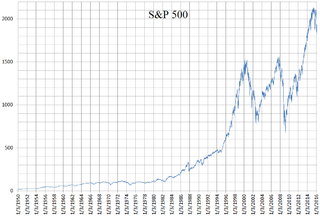
The Standard and Poor's 500, or simply the S&P 500, is a stock market index tracking the stock performance of 500 of the largest companies listed on stock exchanges in the United States. It is one of the most commonly followed equity indices and includes approximately 80% of the total market capitalization of U.S. public companies, with an aggregate market cap of more than $43 trillion as of January 2024.

The London Stock Exchange (LSE) is a stock exchange in the City of London, Great Britain. As of August 2023, the total market value of all companies trading on the LSE stood at $3.18 trillion. Its current premises are situated in Paternoster Square close to St Paul's Cathedral. Since 2007, it has been part of the London Stock Exchange Group. Despite a post-Brexit exodus of stock listings from the London Stock Exchange, the LSE was the most valued stock exchange in Europe as of 2023. According to the 2020 Office for National Statistics report, approximately 12% of UK-resident individuals reported having investments in stocks and shares. According to a 2020 Financial Conduct Authority report, approximately 15% of British adults reported having investments in stocks and shares.
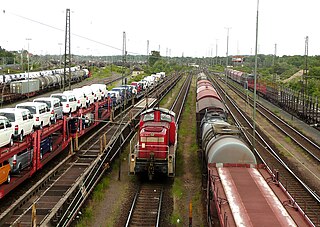
The term rolling stock in the rail transport industry refers to railway vehicles, including both powered and unpowered vehicles: for example, locomotives, freight and passenger cars, and non-revenue cars. Passenger vehicles can be un-powered, or self-propelled, single or multiple units.

A public company is a company whose ownership is organized via shares of stock which are intended to be freely traded on a stock exchange or in over-the-counter markets. A public company can be listed on a stock exchange, which facilitates the trade of shares, or not. In some jurisdictions, public companies over a certain size must be listed on an exchange. In most cases, public companies are private enterprises in the private sector, and "public" emphasizes their reporting and trading on the public markets.

A joint-stock company (JSC) is a business entity in which shares of the company's stock can be bought and sold by shareholders. Each shareholder owns company stock in proportion, evidenced by their shares. Shareholders are able to transfer their shares to others without any effects to the continued existence of the company.
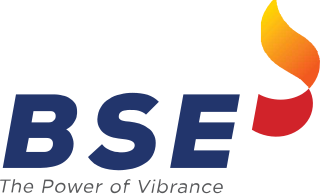
BSE Limited, also known as the Bombay Stock Exchange (BSE), is an Indian stock exchange which is located on Dalal Street. Established in 1875 by cotton merchant Premchand Roychand, it is the oldest stock exchange in Asia, and also the tenth oldest in the world. The BSE is the world's 6th largest stock exchange with a market capitalization exceeding US$5 trillion on May 21, 2024.
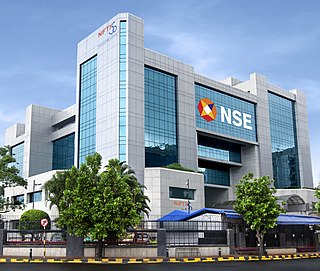
National Stock Exchange of India Limited (NSE) is one of the leading stock exchanges in India, based in Mumbai. NSE is under the ownership of various financial institutions such as banks and insurance companies. It is the world's largest derivatives exchange by number of contracts traded and the third largest in cash equities by number of trades for the calendar year 2022. It is the 7th largest stock exchange in the world by total market capitalization, exceeding $5 trillion on May 23, 2024. NSE's flagship index, the NIFTY 50, is a 50 stock index that is used extensively by investors in India and around the world as a barometer of the Indian capital market. The NIFTY 50 index was launched in 1996 by NSE.

Stocks consist of all the shares by which ownership of a corporation or company is divided. A single share of the stock means fractional ownership of the corporation in proportion to the total number of shares. This typically entitles the shareholder (stockholder) to that fraction of the company's earnings, proceeds from liquidation of assets, or voting power, often dividing these up in proportion to the number of like shares each stockholder owns. Not all stock is necessarily equal, as certain classes of stock may be issued, for example, without voting rights, with enhanced voting rights, or with a certain priority to receive profits or liquidation proceeds before or after other classes of shareholders.















